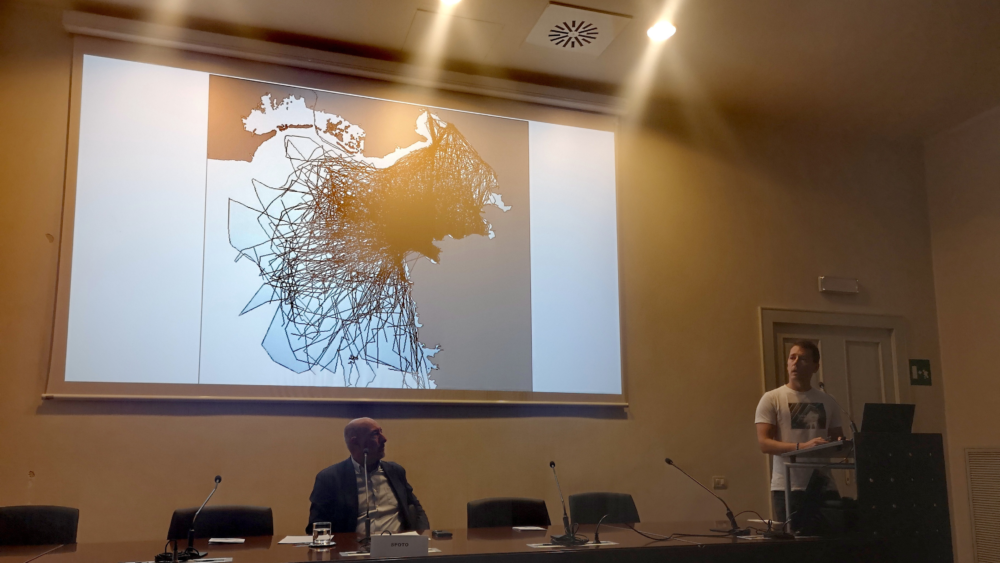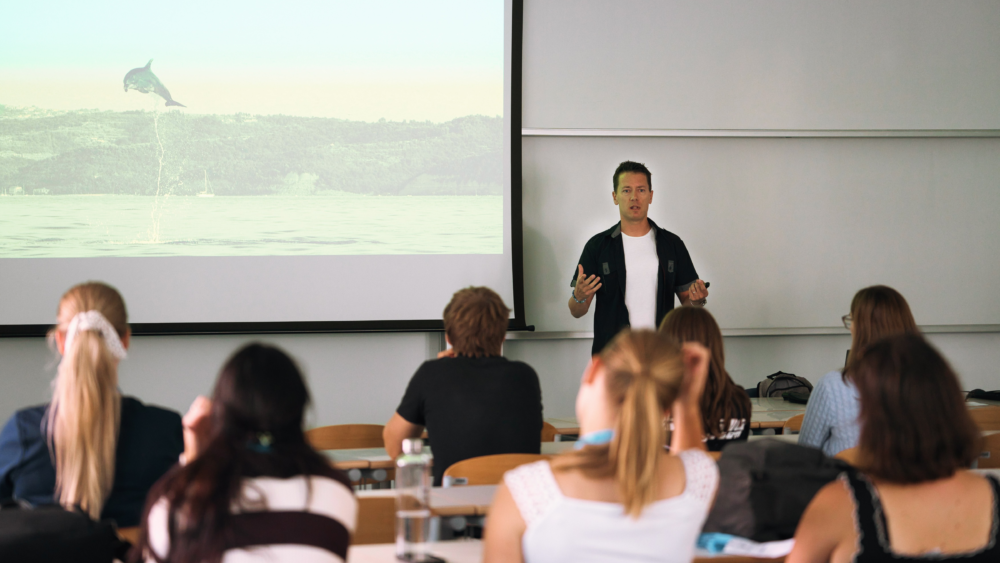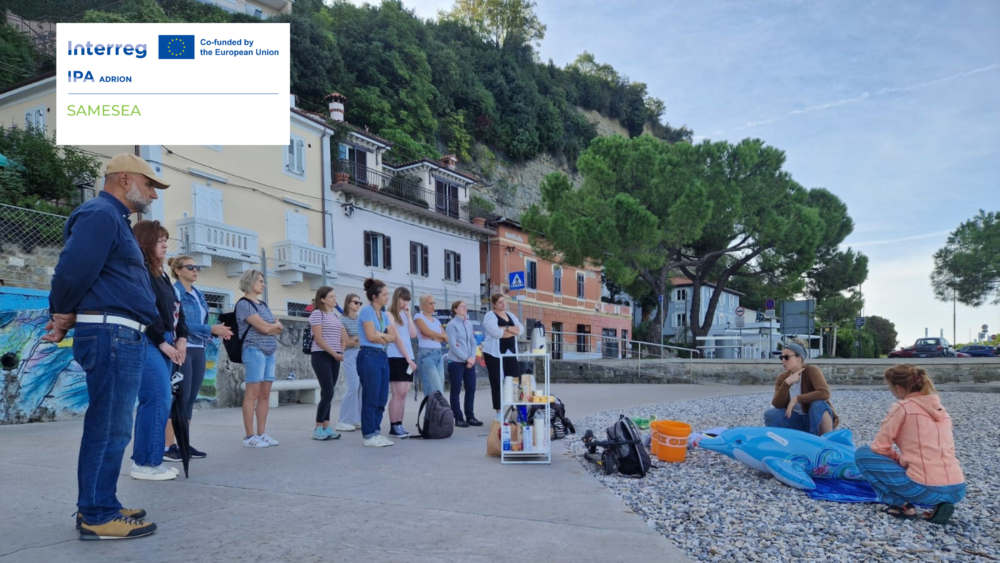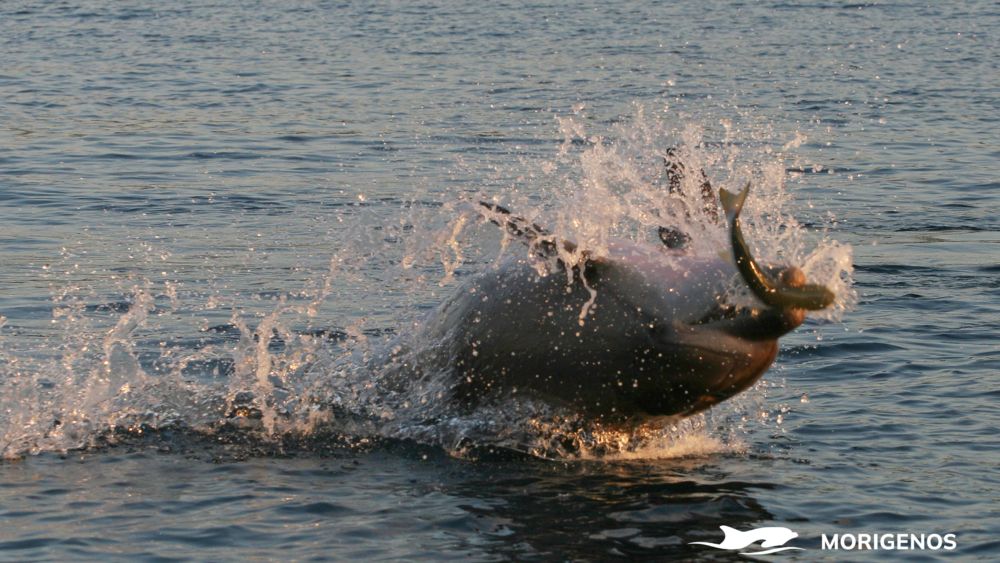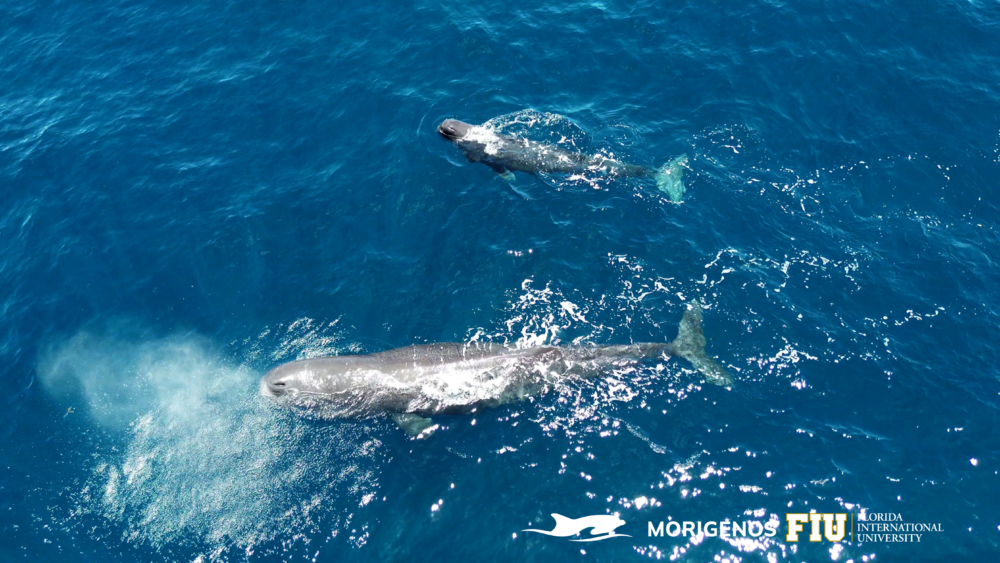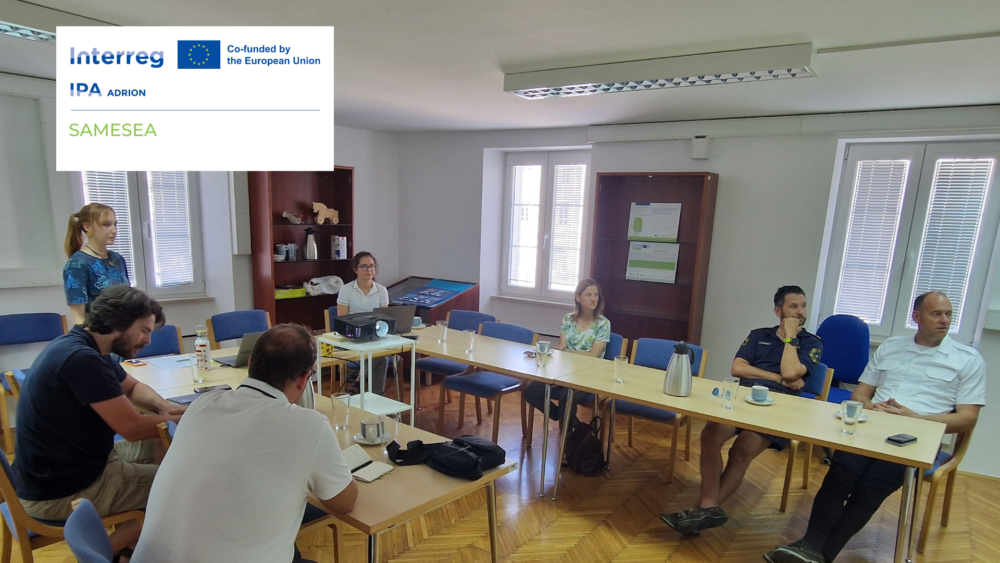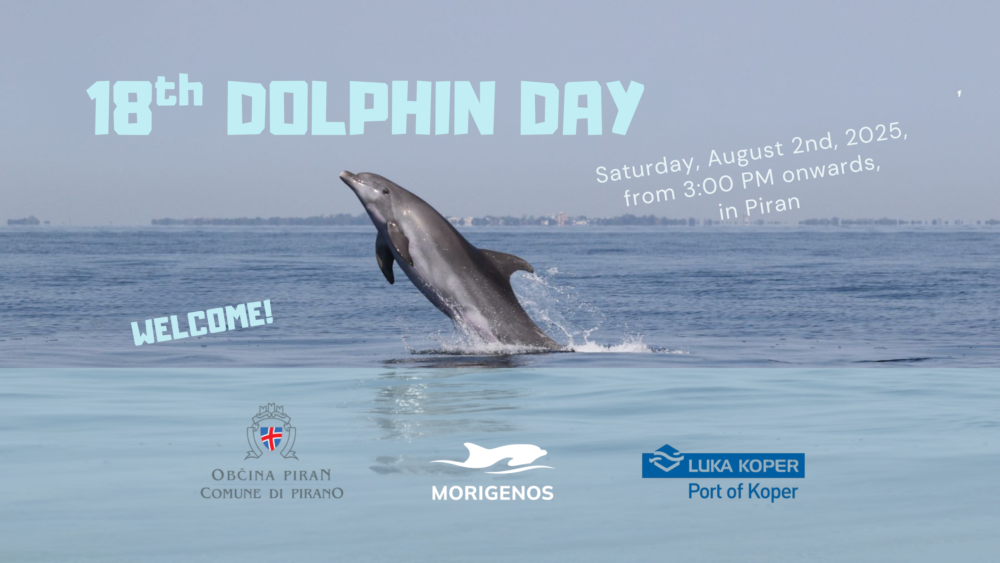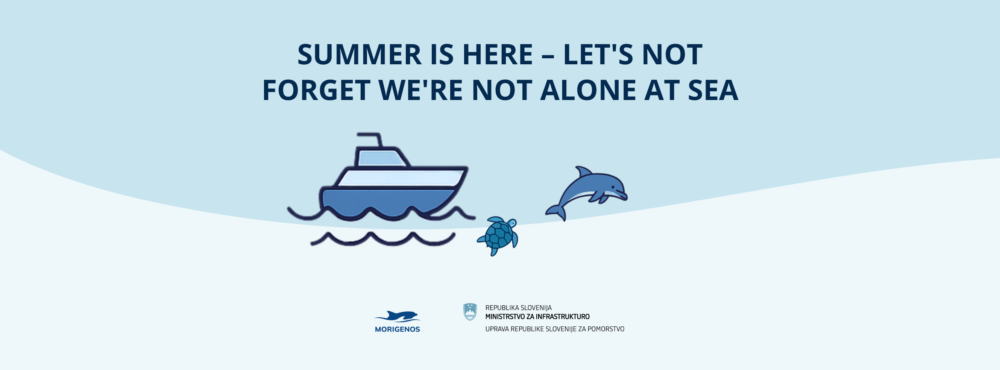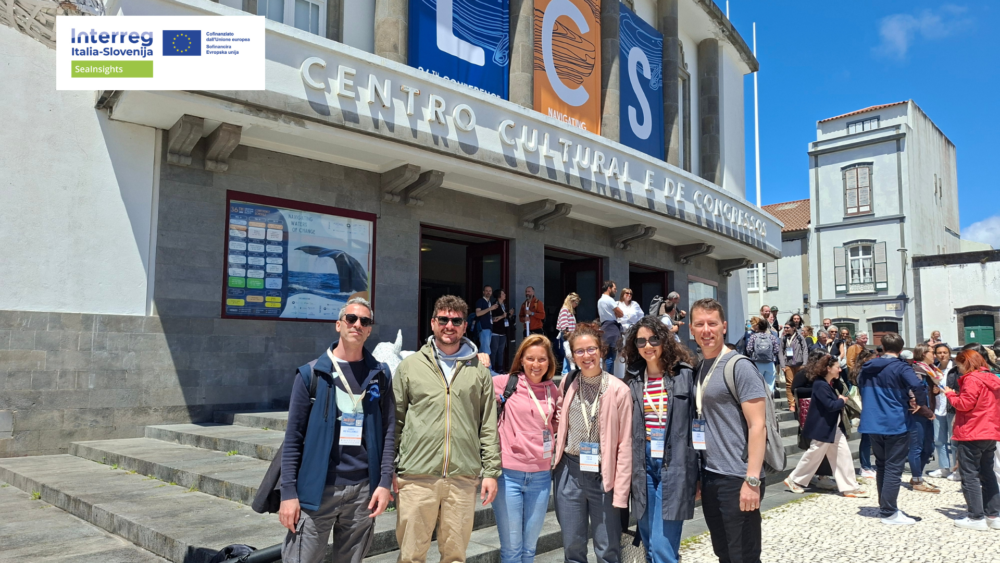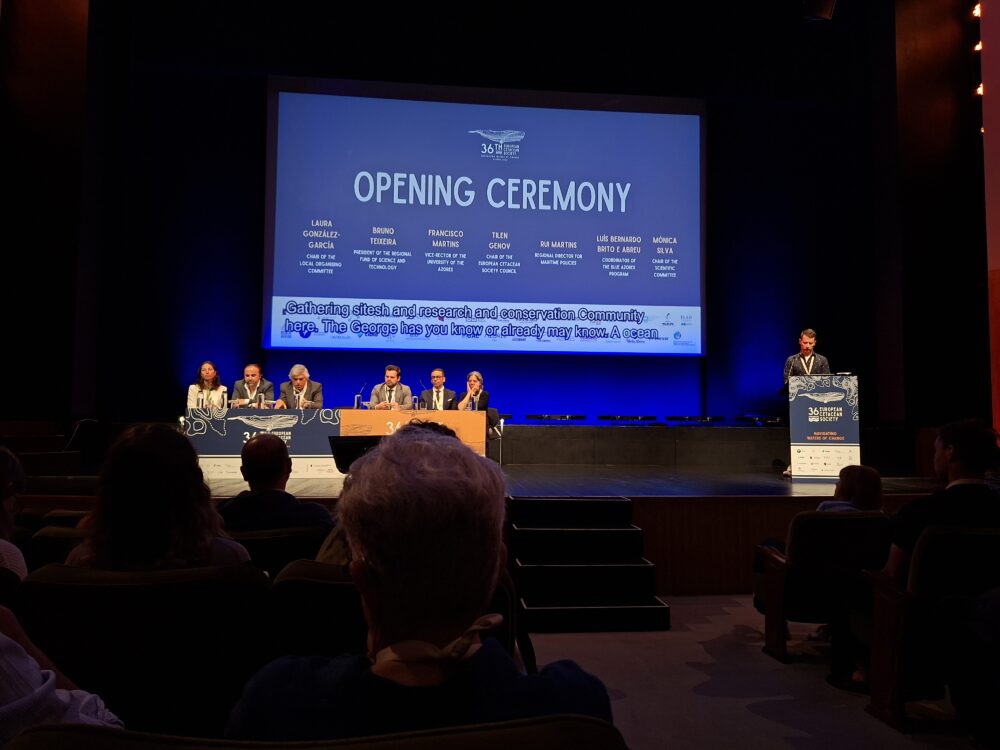07-10-2025
25-09-2025
Morigenos at Famnit (University of Primorska): the importance of studying whales and dolphins
Morigenos at Famnit (University of Primorska): the importance of studying whales and dolphins
On Thursday, 18 September 2025, the president of Morigenos, Assoc. Prof. Dr. Tilen Genov, gave a lecture at the Biology-Psychology Student Conference at Famnit – the Faculty of Mathematics, Natural Sciences and Information Technologies of the University of Primorska.
In his talk “Dolphins of Slovenia, Africa and globally: the importance of studying whales and dolphins”, he took the audience on a journey into the world of these remarkable marine mammals – from the northern Adriatic to West Africa. He highlighted the vital role whales and dolphins play as indicators of ocean health and as symbols of biodiversity conservation. While some species are abundant and widespread, others are rare, endangered, or even on the brink of extinction. Their study therefore reveals much more than just the mysteries of their lives – it tells the story of changes in the oceans and of our impact on them.
Through examples from his own research, Dr. Genov also showed why the protection of whales and dolphins is essential not only for the preservation of marine ecosystems, but also for mitigating climate change.
We are grateful to the organizers for the invitation and for the opportunity to share the importance of marine research and conservation with the conference participants.
22-09-2025
Two-day training for monitoring dolphins, turtles and seals in adriatic sea
Two-day training for monitoring dolphins, turtles and seals in adriatic sea
On Tuesday and Wednesday, September 16 and 17, Morigenos hosted a two-day training titled “Monitoring of marine sentinel species and human activities interaction in the Adriatic Sea”, which was organized in collaboration with our partners from the SAMESEA project.
During lectures prepared by marine mammal and sea turtle experts from Italy, Croatia, Slovenia, Montenegro and Greece, stakeholders were acquainted with the biology of the common bottlenose dolphin (Tursiops truncatus), loggerhead sea turtle (Caretta caretta) and mediterranean monk seal (Monachus monachus), as well as various methods of monitoring these three sentinel species within the Adriatic and Ionian seas. During practical demonstrations the participants could try their hands at rescuing stranded dolphins and sea turtles, and gained hands-on experience at monitoring dolphins from land using binoculars.
The event was attended by representatives from the municipality of Piran , Strunjan Landscape Park, YouSea Institute and NOMED. The lectures and practical demonstrations were prepared by Morigenos, CoNISMa, Montenegro Dolphin research, Blue World Institute, VEFUNIZG and Archipelagos. Many thanks to all the participants and organizers for their collaboration and pleasant company.
16-09-2025
New Research by Morigenos Reveals Distinct Feeding Habits Among Northern Adriatic Dolphins
New Research by Morigenos Reveals Distinct Feeding Habits Among Northern Adriatic Dolphins
Dolphins in the northern Adriatic Sea don’t all eat the same food. For over 20 years, Morigenos has studied the population of bottlenose dolphins (Tursiops truncatus) in the Gulf of Trieste and surrounding waters. Previous research showed that these dolphins form distinct social groups, each with unique behaviours and habitat use. Now, new research led by Morigenos, in collaboration with the University of St Andrews (UK) and the University of Barcelona (Spain), shows that these differences extend to their diet as well.
Published in the renowned journal Science of the Total Environment, the study revealed that bottlenose dolphins in the northern Adriatic Sea display distinct feeding habits, even within the same population. Dolphin social groups occupy different ecological niches, with their own dietary preferences and feeding strategies. These findings suggest that both social and ecological factors shape feeding habits in this population.
“This study shows that dolphins in the same population can behave very differently when it comes to feeding,” said Dr. Tilen Genov of Morigenos, who led the study. “Recognizing these differences is crucial for understanding the impact of human activities on dolphins, and vice-versa, including potential effects on fishing.”
Contrary to popular belief, not all dolphins interact with fisheries in the same way. Some fishermen assume that dolphins always reduce catches or damage nets, but decades of observation reveal substantial variation in behaviour among different individuals or social groups.
Surprisingly, no clear link was found between dietary patterns and levels of harmful pollutants in dolphin tissues. This challenges assumptions that feeding habits alone dictate contaminant exposure and highlights the need to consider more complex ecological factors.
The research underscores the importance of conserving not only species and genetic diversity, but also behavioral diversity. By understanding these subtle distinctions in marine food webs, humanity can make more informed decisions to protect marine ecosystems.
The article is freely available HERE.
14-08-2025
Morigenos Joins Rare Whale Research in St Vincent and the Grenadines
Morigenos Joins Rare Whale Research in St Vincent and the Grenadines
Dr Tilen Genov from Morigenos is currently in St Vincent and the Grenadines, taking part in an international research expedition focused on whales and dolphins—most notably the elusive dwarf sperm whale (Kogia sima), one of the least understood whale species globally.
The expedition, led by Dr Jeremy Kiszka from the Florida International University, brings together researchers aiming to better understand the occurrence, abundance, social structure, ecology, and vocal behaviour of dwarf sperm whales. Data is also being collected on a variety of other species, including spinner dolphins, pantropical spotted dolphins, Fraser’s dolphins, and sperm whales.




Dr Genov plays a key supporting role in the project, with primary responsibilities including operating Unmanned Aerial Vehicles (drones) for aerial observations and contributing to the study of social structure in dwarf sperm whales. He also assists with general fieldwork, contributing to a multidisciplinary team effort. The researchers are using drones, hydrophones, and photo-identification techniques to study these rarely seen marine mammals.
This research not only seeks to advance scientific knowledge but also to support future conservation efforts by providing much-needed baseline data on a species still shrouded in mystery.
Stay tuned for updates as the team continues to uncover the secrets of these deep-diving ocean dwellers.
02-07-2025
Local hub meeting on coexistence of human activities and marine sentinel species successful
Local hub meeting on coexistence of human activities and marine sentinel species successful
On Tuesday, July 24, 2025, we organized a local hub meeting in Piran on the coexistence of human activities with dolphins and turtles in the Slovene sea. Together with representatives of local institutions we discussed existing good practices of coexistence, underlined remaining key issues and gathered suggestions for improving our coexistence with marine sentinel species.
Our conclusions were:
● that informing the public about the presence of dolphins and turtles in the Slovene sea is crucial, especially at the beginning of summer tourist season;
● that more work is needed to improve fishermen’s perception of dolphins;
● that maintaining the marine environment in good condition is too often overlooked by authorities.
The local hub meeting was attended by: Morigenos, the Slovenian Maritime Administration, Police Directorate Koper – Maritime Police, Debeli Rtič Landscape Park, the Fisheries Research Institute of Slovenia and the Public agency for promotion of entrepreneurship and developing projects of Municipality of Izola. We thank all the participants for their invaluable input. Your cooperation is an important contribution to a sustainable coexistence with marine sentinel species in the Adriatic-Ionian region.
SAMESEA project is co-funded by the European Union through the Interreg IPA ADRION programme.
Project website: https://samesea.interreg-ipa-adrion.eu
16-06-2025
The date of the 18th Dolphin Day is set!
18th Dolphin Day
Join us on August 2nd, 2025, for the 18th Dolphin Day – an event that brings together people, nature, and the sea!
Morigenos – the Slovenian Marine Mammal Society is inviting you for the eighteenth time to the traditional Dolphin Day. This year too, we’ll gather in Piran with a diverse program highlighting the importance of dolphin conservation and their marine environment.
What is the purpose of the event?
To present dolphin research and conservation in the Slovenian sea and to bring the lives of these remarkable animals closer to the public.
Admission is free!
Come, take part, and support efforts to preserve dolphins in our sea. We look forward to seeing you!

The sponsor of the event is the Port of Koper. The patron of the event is the Municipality of Piran.
12-06-2025
Summer is here – let’s not forget we’re not alone at sea
Summer is here!
let’s not forget we’re not alone at sea
With the start of the summer season, the number of vessels and visitors along the coast increases, significantly impacting the marine ecosystem and the wildlife that shares this space with us. Morigenos and the Maritime Administration of the Republic of Slovenia are therefore highlighting the importance of respectful and responsible conduct at sea.
The marine area off the Slovenian coast represents a vital habitat for numerous marine species. Among them is a resident population of bottlenose dolphins (Tursiops truncatus), which use this area for feeding, reproduction, and resting. During the summer months, newborn calves are often present, making the animals especially vulnerable. From late spring to autumn, loggerhead sea turtles (Caretta caretta) are also regularly observed in this area – mostly younger individuals that rely on this environment as an important feeding and developmental habitat.
During this period, marine ecosystems face increased pressures due to heightened maritime traffic, greater volumes of plastic waste, and rising underwater noise levels. Vessels generate noise that interferes with animals’ orientation and communication – in dolphins, this can lead to separation between mother and calf when vocal contact is disrupted. Additionally, the high density of fast-moving vessels raises the risk of collisions, which can be fatal for dolphins and turtles alike.
The sea is not only a place of recreation for humans, but also a complex and sensitive habitat for many species. By caring for it properly, we ensure that we too can continue to enjoy a clean and healthy sea.

Dr. Tilen Genov,
Morigenos
How can you contribute to the safety of marine animals?
Reduce your speed
● Lower speeds reduce the risk of striking dolphins or turtles – especially vulnerable calves near the surface.
● Slower navigation also decreases underwater noise pollution.
If you spot dolphins
● Do not approach them directly – navigate slowly and parallel to their direction.
● If possible, keep your engine in neutral or switch it off.
● Do not chase dolphins – if they wish to approach, they will.
● Avoid sudden changes in speed or direction.
● Maintain a distance of at least 100 metres.
● Do not approach groups with calves.
● Do not feed or attempt to swim with dolphins.
● Limit your presence to 15 minutes.
● Report sightings of live, stranded, or deceased dolphins to Morigenos: +386 (0)31 77 10 77.
Do not litter
● Plastic waste endangers marine life – turtles, birds, and dolphins may ingest it or become entangled, leading to painful death.
● Plastic degrades into microplastics, which enter the food chain – including ours.
Respect navigational and environmental rules
● Avoid entering protected zones where navigation is prohibited.
● Anchor only in permitted areas – use designated buoys or moorings to prevent seabed damage.
Treat animals with care
● Animals also feel fear and pain.
● Handle snails, crabs, jellyfish, and other coastal animals gently and respectfully.
● If you see injured or stranded turtles, call 112 immediately.
Respecting navigation rules and appropriate behaviour at sea is not only a matter of environmental protection but also of human safety. High-speed boating near the shore or in protected areas endangers both marine species and swimmers. Responsible conduct reflects our respect for the shared space we inhabit – with other people and with sensitive, often threatened species.
Jadran Klinec
Director of the Slovenian Maritime Administration
By acting responsibly, we help protect safe habitats for marine animals and maintain a pleasant environment for ourselves. This ensures that we can continue to enjoy the sea – safely, respectfully, and in harmony with nature.
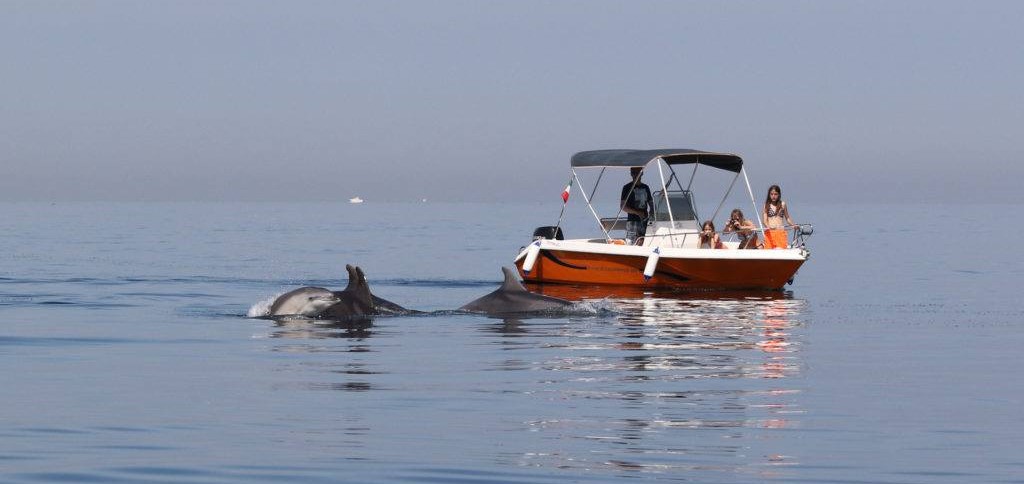
23-05-2025
Participation at the 36th Annual European Cetacean Society Conference
Participation at the 36th Annual European Cetacean Society Conference
Our team recently returned from the 36th Annual European Cetacean Society (ECS) Conference, held in Ponta Delgada, Azores – an important meeting for marine mammal scientists and conservationists across Europe.
This year’s conference held particular significance for our organization, as it marked the first ECS annual meeting chaired by Tilen Genov, following his election as Chair of the Society in 2024.
As part of our participation, team members Krista Lokar and Shakira Quiñones presented two scientific posters addressing human-related threats to our bottlenose dolphin population, as part of our Work Package 2 of our ongoing SeaInsights project.
In addition to the poster presentations, our team took part in a specialized genetics workshop, gaining insight into advanced methodologies for population genetics, environmental DNA and their conservation applications. We also took advantage of this occasion to meet with our SeaInsights collaborators from the University of Padova to exchange updates and ideas about our project.The conference offered a valuable opportunity to share our findings, exchange insights, and learn from leading experts in marine mammal research and eDNA methodologies. At the same time, our participation enhanced the visibility of the SeaInsights project, fostering broader recognition and potential collaborations within the scientific community.
We are grateful for the opportunity to participate and share our findings with the wider marine science community. Events such as the ECS Conference are essential for fostering collaboration, exchanging knowledge, and advancing the conservation of cetaceans and their habitats.
The SeaInsights project is financed by the European Union as part of the Program VI-A Italy-Slovenia. Project website: https://www.ita-slo.eu/en/seainsights
14-05-2025
Successful Opening of the 36th Annual Conference of the European Cetacean Society in the Azores
Successful Opening of the 36th Annual Conference of the European Cetacean Society in the Azores
The Morigenos team is currently attending the European Cetacean Society (ECS) Conference, taking place this week in the Azores, Portugal.
Dr. Tilen Genov of Morigenos, who serves as President of the European Cetacean Society, officially opened the 36th Annual ECS Conference today in Ponta Delgada. This is the first ECS conference held under his leadership, following his election as President last year.
Established in 1987, the European Cetacean Society aims to promote scientific research and the conservation of marine mammals, while also raising awareness and sharing knowledge among its members and the wider public. The Society hosts its annual conference in a different European country each year. This year’s event is being held in the Azores, a region celebrated for its rich marine biodiversity.
The conference began with two days of workshops, and today marks the start of the main programme, which will run until 16 May. More than 700 participants from over 51 countries are presenting the latest research on the biology, ecology, behaviour, and conservation of whales and dolphins. Special focus is being placed on innovative methodologies such as telemetry, genetics, and science communication.
In his opening address, Tilen Genov, a long-time researcher and President of Morigenos, thanked the organisers and highlighted the importance of collaboration and knowledge exchange for the effective conservation of marine mammals.
Further information about the conference and programme is available on the official ECS website:
https://www.europeancetaceansociety.eu
18-04-2025
Job opening: Scientist
Job Description
• Work on an Interreg project
• Scientific research in the fields of biology, ecology, and marine mammal conservation
• Fieldwork and/or laboratory work, data analysis, maintenance of research equipment, record-keeping, and database management
• Writing scientific articles and professional contributions, preparing materials, participating in work meetings, contributing to project preparation and applications
• Participating in educational activities as needed
• Performing other related tasks as directed by superiors
Requirements:
• Master’s or PhD in biology, biochemistry, environmental protection, or related sciences
• Good knowledge of English (working language is English)
• Good knowledge of basic computer programs (MS Word, Excel, internet, etc.)
• Ability to work in a team
• Ability to work independently
• Precision, responsibility, reliability
• The position is based in Piran
Preferred Qualifications (Not Mandatory):
• Boat leader’s license
• Diving certificate
• Knowledge of advanced software tools for data processing (e.g., R, Python)
• Knowledge of geographic information systems (e.g., QGIS)
• Experience with unmanned aerial vehicles (“drones”)
• Previous experience in one or more of the following fields: marine biology, animal ecology, molecular biology, bioacoustics
• Knowledge of Italian
The employment contract will be for a full-time position (40 hours per week, 100%) for a fixed term until 28 February 2027, with a possibility of extension. The contract includes a three-month probation period. The expected start date is as soon as possible, no later than 15 June 2025. The work will be carried out entirely on-site in Piran, Slovenia.
Please send your CV and cover letter to morigenos@morigenos.org by 30 April 2025 at the latest. Interviews will be conducted on a rolling basis, and the position will be filled as soon as a suitable candidate is found, so we encourage you to apply as soon as possible.


